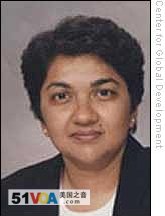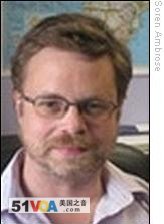Washington, DC
22 April 2009
This week-end, ministers of finance and leaders of development NGOs will meet with officials of the International Monetary Fund and World Bank in Washington. Among the topics will be reform of the two global financial institutions, which were created by the United States and its allies to fund and guide economic development after World War II. From Washington, VOA's William Eagle reports.
A few weeks ago, the leaders of the world's most industrialized countries, the G-20, promised a trillion dollars in support for developing countries hit by the most severe global economic downturn in more than 50 years.
![[insert caption here] [insert caption here]](/english/Archivehttps://img.51voa.cn/images/promo_imf-logo_26mar01_0.jpg) |
Usually, the IMF chief is a European, while the head of the World Bank is an American. Reformers would like to see the posts opened to the most skilled candidates, regardless of region.
Also, the 185-member executive board of the IMF is weighted toward the West. Major decisions must have the support of more than 85 percent of the votes cast by the board.
Its members are allotted a different percentage of votes. The United States has 17 percent, in effect giving it veto power, preventing other countries from reaching the 85-percent of the votes needed to pass significant policy changes. Twenty-five nations of the European Union have 32 percent of the vote. The combined voting shares of China, India, Brazil and Mexico are a little over 10 percent. Sub-Saharan Africa has just more than four percent.
Two researchers at the Center for Global Development in Washington want to change that.
A senior fellow at the Center, Vijaya Ramachandran, and co-author Enrique Rueda-Sabater complain the power of board members is based on a combination of factors, including economic and geo-political influence. Some of the world's most populous countries, including Pakistan, and most important economies, like China and India, are underrepresented.
The Two Percent Solution
Ramachandran says this proposal would apportion voting shares to any countries that have either two percent of the world's population or two percent of global GDP. The new arrangement changes the balance of power in favor of those with large populations or large economies. The plan, she says, balances representation and effectiveness in a transparent manner.
 |
| Vijaya Ramachandran |
"Some [lack the] population or economic [strength to figure in the plan]: neither Australia nor South Korea have two percent of the world's population or GDP, [though they do have] significant influence [on the boards of the IMF and World Bank relative to India, Nigeria and other populous countries]."
Under the plan, the countries that do not make the two percent cut could be organized in regional blocs and be represented on the board by a leader chosen by member countries. Leadership could be held on a rotating basis. This, she says, would bring small and midsize countries to the table.
The Double-Majority System
Others have different ideas.
The development finance coordinator for ActionAid International in Nairobi, Soren Ambrose favors a "double-majority" system requiring a majority of member countries to approve significant decisions. This would be in addition to the system in use today.
 |
| Soren Ambrose of ActionAid |
Ambrose says under this plan, a wealthy minority could not overrule the bulk of member countries.
"For a major decision or policy change to happen," he said, "there should be a required a second vote requiring a [majority of] countries. So it would be like U.N. General Assembly, where you would need a majority of countries in the IMF to support a proposal for it to pass, in addition to getting a majority of votes under current voting arrangements."
The calls for change extend to the World Bank as well. One solution is supported by an NGO supporting reform, the Bretton Woods Project. It calls for a system of parity between members, where lenders and borrowers would each have an equal number of votes on the bank's executive board.
Ramachandran of the Center for Global Development says the proposals do not enjoy universal support. Some fear the reforms might dilute the strong working relationship between the united States and Europe, which are said to be critical for development.
On the other hand, development activists fear that without better representation, emerging powers like China and India are not likely to cooperate on issues such as limiting greenhouse gas emissions or increasing support for efforts by the IMF and World Bank to shield poor countries from the global recession.